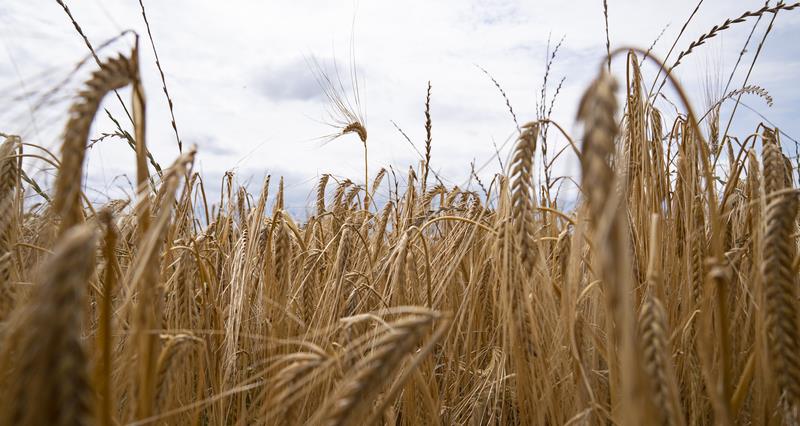Nitrogen use efficiency is a measure of how effectively nitrogen fertilisers are used in agriculture to support crop growth. Whilst some nitrogen will be stored in the soil for a future crop, any remaining nitrogen will be lost through leaching into groundwater or emitted into the atmosphere.
NUE varies depending on the crop, soil type and agricultural practices used throughout the farming year. Improving NUE is a key challenge for sustainable agriculture in the UK and requires a combination of measures to help make farm businesses more efficient.
Reaching net zero
A key finding from a number of farm emission calculations is that inorganic fertiliser, accounting for its production and application, contributes towards approximately 50% of a farm’s greenhouse gas emissions.1 At the same time, one of the main yield limiting factors for combinable crops in the UK is low nitrogen availability.
To reduce the emissions attributed to each tonne of grain grown in a field, it is vital that crop yields are at the very least maintained. If yields decline in the pursuit of low greenhouse gas emissions, the emissions created in growing a crop in a field will be ‘spread across’ a smaller tonnage, resulting in an increase in carbon footprint per tonne of grain harvested.
This is why focusing on nitrogen use efficiency is so important, as it allows you to maximise the return on your investment when applying fertiliser, and reduce the carbon footprint per tonne of product.
Uptake vs utilisation efficiency
Nitrogen use efficiency can be split into nitrogen uptake efficiency and nitrogen utilisation efficiency. Nitrogen uptake efficiency is primarily affected by root activity, dictated largely by soil type, soil moisture and varietal differences.
Nitrogen utilisation efficiency is more dependent on the photosynthetic properties of a crop canopy, and the ability of that plant to convert sunlight, temperature and moisture into yield. The ability of a crop to do this is also affected by differences in variety.
Genetic Technology (Precision Breeding) Act
On 23 March 2023 the Genetic Technology (Precision Breeding) Bill received Royal Assent to become an Act of Parliament. The unshackling of this technology should accelerate the ability for plant breeders to introduce favourable traits within plant varieties, which is only replicating what could have occurred via traditional breeding methods or naturally, but at a faster pace.
The EU has proposed a , called New Genomic Techniques by the European Commission, which highlights how they will categorise gene edited plants in the marketplace.
Read: What you need to know about gene editing in agriculture
Gene editing research
In recent years, the development of precision breeding technology has advanced the opportunities that gene editing can offer the UK agriculture industry. Amongst the many potential benefits of gene editing, such as drought-tolerant wheat and non-allergenic varieties, improvements can be made in the efficiency of nitrogen to enhance crops yields without increasing nutrient application. , a national UK wheat research programme, note that to increase yield in both present and future climates, genetic improvements in efficiency traits are required.
NUE is a complex trait in combinable crops controlled by a large number of genes, and its improvement requires a focus on both uptake and utilisation. There’s plenty of research on how gene editing can help improve NUE, supported by work such as Tony Miller’s at the John Innes Centre on how nitrogen transporters manage the balance between nitrate and ammonium within a plant cell. He notes that these transporters play a key role in sensing nitrogen availability in the soil.2 A few potential applications of this are outlined below to keep members abreast of future technology and developments that may be coming in the combinable crops sector.
Nitrate transporters in the plant can be enhanced by overexpressing a specific gene, which in turn will increase the number of tillers on a plant. This increase in biomass ultimately improves the final yield of the crop from the same quantity of applied fertiliser, improving the NUE.
Practical progress
The promotion of ammonium transporters has so far been less successful, with some benefit seen in the development of root structure but a detrimental impact on growth and yield due to the toxicity of ammonium upsetting the metabolic balance and causing plant growth disorders.
Further approaches have identified the ability to knock out the negative regulators of nitrogen uptake to improve mobilisation of the nutrient, however there are concerns that the resulting grain size may be reduced which will restrict the benefits to NUE.
The development of gene editing combinable crops is very much in its infancy, with field trials at Rothamsted Research only recently permitted. However, experiments from previous years show that there is potential for the technology to improve NUE in crops such as wheat, and UK farmers should remain aware of the opportunities that can help reduce their business’ carbon footprint that may be on the horizon.
References
1. Yen Zero. 2022. Crop C Footprint Benchmarking Assessment 2022.Â
2. Anthony Miller et. al., 2020, "Overexpression of the High-Affinity Nitrate Transporter OsNRT2.3b Driven by Different Promoters in Barley Improves Yield and Nutrient Uptake Balance", International Journal of Molecular Sciences, 21:1320. doi:10.3390/ijms21041320.
